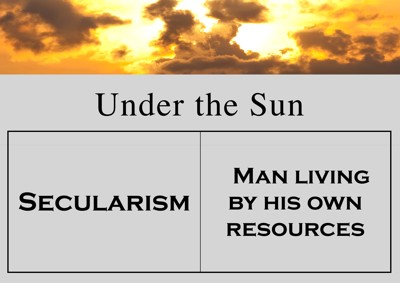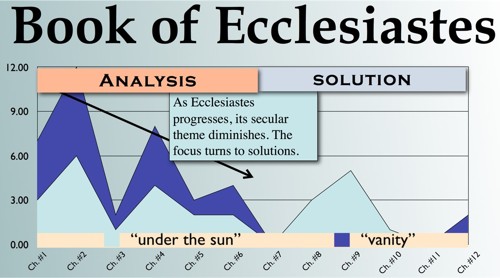

Book of Ecclesiastes: An Introduction & Purpose
Searching for Significance
The Bible Teaching Commentary
Paul J. Bucknell
Ecclesiastes Outline | Design
Ecclesiastes 2:1-11| Ecclesiastes 3:1-22 | Ecclesiastes 4:4-5:7
Ecclesiastes 4:9-12 | Ecclesiastes 9:13-10:20
Purpose: A good understanding of the Book of Ecclesiastes is essential to comprehending the individual passages. One cannot seek understanding of a verse in Ecclesiates without understanding why Solomon wrote the Book of Ecclesiastes.
The Book of Ecclesiastes: an Introduction
King Solomon, the author of the Book of Ecclesiastes, called himself the Preacher, literally the speaker to the assembly. “The words of the Preacher, the son of David, king in Jerusalem” (Ecclesiastes 1:1). It seems rather apparent by the multitude of his confessions that King Solomon, the son of King David, wrote Ecclesiastes after many backslidden years.
Earlier on in his life, during the dedication of the temple, we can see a real earnestness of Solomon's soul. His perceptive prayer of 2 Chronicles 6 and 7 perhaps is the longest and most oft-quoted prayer recorded in the Bible. This was probably the time, early in his life, when he wrote the Song of Songs. At some time, however, he looked back on his life and saw his departure from the Source of life.
He looked like he had a wonderfully fulfilling life, but when he looked back at it, he realized that the deeds, pleasure and accomplishments did not mean anything without a close relationship with the Creator. An outward form of religion never provides a substitute to a close relationship with the Almighty God. The world stood up and recognized Solomon's great achievement, but he unashamedly admits that having all and not having God is absolute meaningless.
Down deep in Solomon's heart, there was a seed of corruptness that was not kept under self-control. It grew out of control and distorted his life perspective. Only later in life, did he finally observe the difference between life and living. Life could not find its meaning in the many projects that he had involved himself in. They only became distractions to the real meaning in life, only found in God. God was near his heart but not his first love. He loved other things more than the Lord. His life before this writing clearly showed this.
Only later in his life did he slow down to catch a view of what he had done. Perhaps he was alluding to the wrestling of his heart in his words, “He has also set eternity in their heart, yet so that man will not find out the work which God has done from the beginning even to the end” (Ecclesiastes 3:11). Ecclesiastes could well be called 'Solomon's Confessions.' The Book of Ecclesiastes is a sign that he had not only genuinely seen his departure from the Lord but had returned to the Lord of Life.
The Book of Ecclesiastes: Observations
All through the Book of Ecclesiastes we have found King Solomon's oft-repeated phrase, “under the sun.” He used it 27 times, primarily in the first half of the book. The same pattern is found with the word ‘vanity’ used 16 times (see chart). Solomon looks back upon his backslidden life and sees that when man pursues things ‘under the sun’ or apart from God, things are not well.
Not a few people have told me that they feel depressed when reading this book. Some don’t even want to read the book because of it! This was Solomon’s purpose. Whenever a person lives his life apart from the clear influence of God’s grace, he will end up with a sad and unfulfilled life. Something is desperately missing. Unfortunately, man doesn’t observe this right away but often only after most of his life has passed.
The Book of Ecclesiastes: Purpose
As one looks more closely at Solomon’s words, one begins to understand his purpose, largely contained in the later part of Ecclesiastes. The book progresses from depressive analysis to hopeful solutions.
There is no doubt that the beginning of the book is very powerful and can quickly draw one into it. Perhaps this is because his target audience would be so involved in their projects that they have to be pulled away to pause for reflection. Solomon was there. He knew what it took to reach them. There seem to be three main purposes for Ecclesiastes.
(1) He shows how sad and unfulfilled lives are apart from God.
(2) He warns us that happy and prosperous lives will end in disaster if centered on earthly things.
(3) He calls us back to a sensible and good life with God.
Solomon wants to pass on to us his hard-earned discernment, not to make money or a reputation, but to warn and rescue. He is trying to help those caught in the web of secularism’s to escape the plague of a meaningless life and find true fulfillment and joy in the presence of God. Since a fulfilling life cannot be found ‘under the sun,’ then we ought to live ‘under the heaven”–the world influenced by God, that is, the kingdom of God.

The secular society is best described as mankind without God. The modern world boasts that its choice is much greater than the old life of morals and God. They run with a frenzy after new approaches to life and understanding so that they can escape God’s influence in life. Secular man boasts in his choices but hides the consequences: depression, broken relationships, hatred, disease, drugs, loneliness, and anxiety.
Without God, man’s resources are limited to what he has and what he makes out of life. When things go well, he is prideful and content, but when anything threatens his throne, he becomes very insecure and anxious. Because man is missing life’s most essential part, his individual pursuits in life are vain. One cannot be pacified by temporal toys because God has set eternity in his heart.
Next => Outline of Ecclesiastes










